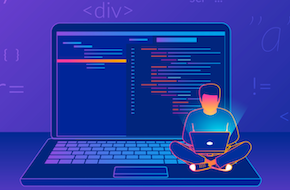
Choose the code editor that’s best for your needs
Basic toolkit, advanced features, or even online!
If you’ve dabbled in writing code, then you’ve likely used some kind of code editor. These are handy programs that will do handy things like automatically format your code for easy reading, provide a user interface with different colors and other indicators for different code elements, and overall make coding a smoother and easier experience. But not all code editors are created equal, and if you’re just starting out you may not know the best tools in the trade. Let the experts at Mr. WPress provide our recommendations for you, to at least point you in the right direction for a great development experience!
Brackets
If you’ve used Udemy or other learning programs, you’ve likely seen the Brackets program. This program is very popular in these types of environments, mostly because of its clean and more minimal user interface. Brackets doesn’t flood the screen with tons of options, and makes everything very clear as to what its purpose is. When you’re just starting, Brackets is a great tool because it lets you focus on the code. It’s still good about helping develop code habits, indenting and cleaning up formatting while also providing basic UI indicators for different code attributes. It doesn’t come with most extra features, but for a solid foundation, it’s hard to go wrong with Brackets.
PHPStorm
A step above Brackets, and our preferred code editor at Mr. WPress, is PHPStorm. This expansive tool is all about turning you into a lightning-fast power user. The options are plentiful, but allow you to customize what you do and don’t see (or just minimize) to ensure your workspace isn’t cluttered. With PHPStorm, you can practically say goodbye to Google, since the documentation for any coding language you can think of is built right in. If you type a PHP function, it will tell you what arguments it’s expecting, what values can be expected, and so much more. This software doesn’t just highlight errors, but tells you what caused them, how to fix them, and provides a link to the reasoning behind it. An expansive array of keyboard shortcuts allows you to perform complex tasks (like cleaning up formatting) or searching an entire directory of files with just a few keystrokes.
While PHPStorm may not be free, you’re getting an amazing value for the low price of this comprehensive coding toolkit.
Visual Studio Code
Another solid option, and one that’s free and open-source to boot, is Visual Code Studio. You don’t get the same guarantees as a paid product in the sense of a features roadmap, official documentation, and customer support. Instead, you’re provided a community of people who built the program and others who work in it every day, and you can lean on them for your questions and support. The user interface is something of a mix between the above two options. It’s somewhat lightweight and streamlined like Brackets, but does come with some options if you know how to dig into the configuration.
Online tools
There are some benefits to foregoing a traditional, downloaded software altogether and opting to use an online tool. Collaboration is built right in, allowing multiple people to work on the same file and see changes live. This can still be achieved with more traditional editors, by hooking them up to another system like GitHub. Though it’s not quite the same as working on the same thing at the same time. This inherently means theirs less setup, since there’s nothing to download or configure, and somebody who wants to jump in to help with the project can do so with little to no friction.
For more expansive projects with multiple directories and tons of files, it’s hard to beat the logistical support and flexible options of something like PHPStorm or Visual Code Studio. But for smaller projects, big teams, or other such use cases, it may be worthwhile to look into an online tool. Codepen, JSFiddle, and Codespaces are all popular, and can provide a great starting point for online development.
At the end of the day, it’s up to you to decide what program best suits your needs. But hopefully we can help point you in the right direction to find the best fit!



